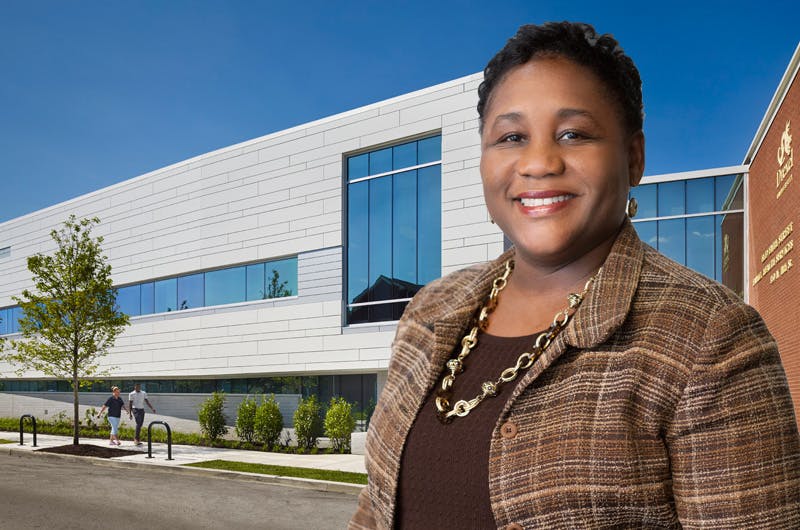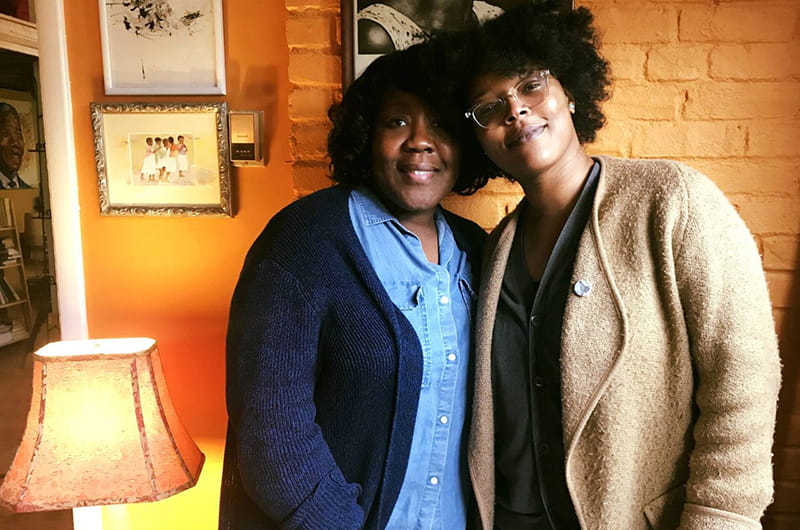A mathematics professor, Dr. Fields was the first Black woman to be named a dean at Drexel. Dr. Fields was the advisor to the Society of Women Scientists & Engineering in the late 1960s and 1970s. Hearing about the discrimination Drexel women enrolled in engineering programs experienced motivated her to conduct a study, funded by a National Science Foundation grant about cooperative education employment trends for women in engineering and science.
She began as a mathematics professor and later became the dean of the University College in 1987. She’s dedicated 25 years to Drexel and was known as a specialist of programs for the economically and educationally disadvantaged.
In 1977 (85 years after Drexel enrolled its first students), Dr. Verna Aileen Rogers became the 1st woman faculty member in Drexel Engineering. Dr. Rogers was also an alumna & earned her BS, MS, & PhD from Drexel.
Dr. Rogers was widely published, specialized in biomedical engineering, and had seven years industrial experience as a project leader and senior analyst for Computer Horizons, Inc.
The Philadelphia Section of the Society of Women Engineers (SWE) recently donated a collection of organizational records to the Drexel University Archives, which are now available for students and researchers to explore in the Archives’ reading room.
The collection includes historical documents and publications from the Philadelphia SWE, such as information about past recipients of the Society of Women Engineers (SWE) national scholarships, Philadelphia section alumnae, and the national organization’s tax returns.
Drexel (then the Drexel Institute of Technology) extended enrollment opportunities across genders in 1943. Even then, there were glaringly few women in engineering at Drexel—but those 17 women who first enrolled in the program gravitated to one another and formed the support group that would be instrumental in founding the national SWE organization—an organization that is now over 75 years old and has encouraged thousands of women in the field.
Stephanie Brooks Featured in New Book Ordinary Extraordinary African American Women: As We Mature [Drexel College of Nursing and Health Professions]
Stephanie Brooks, PhD, senior associate dean for Health Professions and Faculty Affairs at Drexel University’s College of Nursing and Health Professions, is featured in a chapter in Stephana Colbert’s 2021 book, Ordinary Extraordinary African American Women: As We Mature.
The book features 12 women from across the U.S. and chronicles their life stories. “Believing that the extraordinary is often born out of the ordinary, in sharing the journeys of these twelve women—who represent hundreds of thousands of African American women whose stories go untold—author Stephana Colbert knows that if we do not set pen to paper and create a narrative around their stories, these women and their stories will vanish from our histories,” states the Jewell Jordan Publishing press release.
The second book in a series, author and publisher Colbert is dedicated to making sure that stories of African American women “who have experienced heartache and pain, joy and sorrow” are heard. “They fell and struggled, but were courageous, strong and persevered despite their conditions or predicaments.”
Black Entrepreneurs Firsts Who Paved the Way [via the Drexel Charles D. Close School of Entrepreneurship]
It is stories like these that show courage in starting a business and thinking like an entrepreneur. The entrepreneurs featured below took steps that were not taken by others before them, and became an inspiration an example of success to many entrepreneurs in the Black community. Whether they worked from the ground up to become a successful CEO or to become the first Black millionaire and even billionaire! Their stories are perfect examples that anyone can become a successful entrepreneur through dedication, hard work, and a passion for what they do.
Examining Drexel’s Ties to the First African-American Women Physicians
The Female Medical College of Pennsylvania (FMCP), founded in 1850, provided students opportunities to earn a medical degree, including several of the first African-American women physicians in the country. An associated Woman’s Hospital of Philadelphia was founded in 1861, and the school was renamed the Woman’s Medical College of Pennsylvania (WMCP) in 1867. WMCP became the co-ed Medical College of Pennsylvania in 1970. In 1996, it became the Allegheny University of the Health Sciences after merging with Hahnemann Medical College, a similarly historic and equal-opportunity medical school (Hahnemann’s first African-American student, Thomas Immes, graduated in 1884). Later renamed MCP Hahnemann University in 1998, the institution became the College of Medicine after Drexel acquired it in 2000.
 Dr. Roberta Waite Associate Dean of Community-Centered Health & Wellness and Academic Integration, Drexel University [Diverse Issues in Higher Education]
Dr. Roberta Waite Associate Dean of Community-Centered Health & Wellness and Academic Integration, Drexel University [Diverse Issues in Higher Education]
Dr. Roberta Waite is a tenured professor in doctoral nursing and associate dean of Community-Centered Health & Wellness and Academic Integration at Drexel University. Waite also serves as the executive director of the Stephen and Sandra Sheller 11th Street Family Health Services of Drexel University, operated in partnership with Family Practice and Counseling Network. Waite created the Macy Undergraduate Leadership Fellows Program, an interdisciplinary program for students in the College of Nursing and Health Professions and the School of Public Health, focusing on leadership development while concurrently fostering critical consciousness using a social justice lens.
Waite’s scholarship and research centers on behavioral health, structural influencers of health and racial justice. Waite serves as a board director for corporate Trinity Health (a leading, national, multi-institutional Catholic health care delivery system in 22 states with 93 hospitals and 120 continuing care locations including home care, hospice, PACE, and senior living facilities), the American Professional Society of ADHD and Related Disorders and Family Process Institute. She recently served as an expert for Governor Tom Wolf’s Think Tank to develop guidelines and benchmarks for a Trauma Informed Commonwealth of PA. Currently, she is on the leadership team of Healing-Empowerment-Advocacy-Learning-Prevention-Action Trauma-Informed Pennsylvania co-chairing the Racial and Communal Trauma Prevention Action Team. She is also on the Advisory Group for COACH (Collaborative Opportunities to Advance Community Health), a cross-sector collaborative that brings together health systems and community-based organizations to address community health needs in Greater Philadelphia. Effective July 1, she will be the next dean of Georgetown University’s School of Nursing.

Trapeta Mayson (pictured left) and Yolanda Wisher (pictured right), adjunct instructors in the Department of English and Philosophy in the College of Arts and Sciences at Drexel University, are teaching “Black Women Writing: Short Stories (CW T680)” to graduate students. No matter who is studying or reading along, each educator is dedicated to this divergence from the single story. “What's most exciting about this course is the times when we do get together and just talk about characters,” Wisher said. “People that we've never met — and who don't exist — but who give us a way to talk about the hard stuff.”
Jeannine Cook, a second-year MFA student as well as community activist and owner of Harriett’s Bookshop, first witnessed the instructors’ “masterful co-teaching” as part of the initial Rosenbach course, and now again as part of her graduate coursework. Everything she is learning, Cook said, makes her a better writer, a better businesswoman and a better Philadelphian.
National Traveling Exhibit Returns to Celebrate Women of Color in Psychology [Drexel College of Arts and Sciences]
[Drexel College of Arts and Sciences]
Through quizzes, videos, posters, photos and other interactive activities, I Am Psyched! uses the history of psychology to engage all audiences, including people of color, inspire their interest in the profession, and demonstrate how psychology can be used for social change. Visitors learn the stories of pioneers such as Mamie Phipps Clark, whose research on the effects of racial segregation on Black children was used in the 1954 Brown v. Board of Education Supreme Court case, resulting in the integration of public schools.
“These contributions went largely unnoticed because they were made by women of color,” said Dorothy R. Charbonnier, PhD, associate teaching professor of psychological and brain sciences and the coordinator of I Am Psyched!@Drexel. “This includes Black and indigenous people, but also Asian and Native American women. I Am Psyched! is an amazing presentation of what these women did and how it changed society.”
Celebrating Women’s History Month with the Academy of Natural Sciences
The Academy has long been a home for women scientists to learn, research, collaborate and build their careers. With March being designated Women’s History Month, we thought it a good time to get to know a few of the people who are continuing that legacy.
Celebrating Women In Natural Sciences (WINS) Successes
For 38 years, the Academy’s Women In Natural Sciences program has been providing young women from Philadelphia public and charter schools with hands-on science workshops, career and college exploration and positive youth development.
WINS students receive the information, encouragement and confidence they need to shape their futures and redefine what it means to be a leader in science, technology, engineering and mathematics (commonly referred to as STEM). The program’s mentoring and support has resulted in 100% of WINS students graduating high school and over 96% attending college.
Mystery in the Library for Women’s History Month
“Many of the women who appear in photographs and written records in our archives are anonymous or semi-anonymous, referred to (if at all) as Miss or, if married, by their husband’s name. We know that many women were part of the Academy’s history; we just don’t know their stories yet. Current and future research will change that. And I began with this photograph.” - Jennifer Vess, Brooke Dolan Archivist
